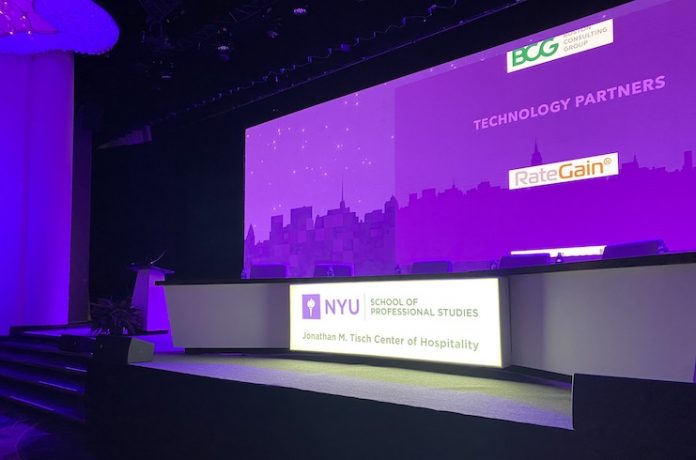
NEW YORK—The global travel and lodging industry has experienced a multitude of changes over the last decade including dozens of new brand launches and the emergence of new technologies that have transformed booking and guest experiences. During this time, many industry leaders have grown concerned with the rising cost of labor and what that means for the industry. The global pandemic compounded this pressure on the labor market, which responded to historically low occupancy rates (nearly as low as 20 percent in the United States) by furloughing thousands of workers.
While the situation has improved incrementally, a recently authored whitepaper identifies the causes and reverberations of a labor shortage that continues to challenge a full recovery. The paper—Reimagining the Workforce: The Future of Work in Hospitality— is a collaborative research effort between Boston Consulting Group (BCG) and the NYU School of Professional Studies (NYU SPS) Jonathan M. Tisch Center of Hospitality, and was presented at the NYU International Hospitality Industry Investment Conference, this week.
“The paper, which is the first in a series, will serve to launch an industry think tank initiative facilitated by the Tisch Center and BCG, who will convene industry leaders to identify, define, and coordinate the most effective strategic solutions for current labor challenges. That process begins by understanding the current situation, its root causes and implications—all issues that are explored in the white paper,” said Nicholas Graf, Jonathan M. Tisch chaired professor and associate dean, NYU SPS Jonathan M. Tisch Center of Hospitality.
“This industry experienced an unprecedented disruption over the past two years, and no single organization alone will overcome the labor challenges that continue to impact operational stability and recovery,” said Tom McCaleb, managing director and partner at Boston Consulting Group. “While there will be some quick wins, the long-term solutions will be cross-industry and complex. The industry has a choice—it can use the labor challenges as a catalyst for innovation. Hospitality businesses must understand what employees value most and then adapt by innovating their employee value proposition, talent acquisition and management, and actions to increase equity and diversity.”
Key White Paper Takeaways
- While nearly 70 percent of global travel and tourism workers were either laid off or were subject to decreased working time during the pandemic (2021 BCG/The Network “Decoding Global Talent”), when conditions for travel and tourism improved, most of the guests returned, but many hospitality, travel, and tourism employees chose not to go back to their jobs.
- Two self-reinforcing issues are behind the post-pandemic exodus of employees from the hospitality, travel, and tourism industries—shifting labor demographics and labor-force participation and changes in employee preferences after the pandemic.
- Shifting labor demographics and labor-force participation: The accommodation and food Service sector had nearly 1.6 million job openings in July 2021, according to the U.S. Bureau of Labor Statistics. That is roughly twice as many openings as in December 2019. But the labor force in leisure and hospitality declined by approximately 10 percent over roughly the same period (January 2020 to August 2021). The decline caused labor shortages and higher labor costs.
- Changes in employee preferences after the pandemic: Industry employees have also shifted their priorities, and the whitepaper focuses on three key aspects of what is now more important than ever to those working in hospitality, travel, and tourism. These factors are categorized as: What matters at work, where and when employees want to work, and the importance of social values. What matters at work now includes shorter-term factors such as relationships with colleagues and superiors, as well as factors related to job security and financial stability as opposed to longer-term factors such as career development opportunities and skills training.
- When labor costs rise, companies in the hospitality sector often try to reduce costs elsewhere. The research showed that many hotels have eliminated key services and/or have switched to an “only upon request” service mentality; reduced scope of food and beverage outlets; and have decreased high-value amenities such as airport shuttles. These may also reduce the average daily rate (ADR), because guests are unwilling to pay as much as they used to for the reduced services and the diminished experience. Exacerbating this is the negative impact of the service cuts on the employee experience, which is driving even more people away from the industry. Hotels thus risk a downward spiral that leaves profit squeezed between the rising labor costs and the declining ADR.
- When and where employees work has also changed, as flexibility has become an important decision criterion for job seekers. The hotel industry has felt the impact, with 36 percent of employees pivoting away from hospitality in favor of jobs with a self-directed schedule like driving for a rideshare service or delivering groceries on-demand. Another 17 percent have switched to a job with weekly variable schedules, as opposed to fixed-schedule part-time jobs.
The prevalence of social values in the workplace has also become mission critical to businesses. Based on the results of a 2021 BCG/The Network study, diversity and inclusion are significant factors for employees in the travel and tourism industry. Some 75 percent of participants indicated that the issue of diversity and inclusion has become more important to them over the past year, with higher agreement towards this sentiment for respondents under 40 years old. Additionally, 53 percent of employees indicated they would rule out companies that don’t match their beliefs when it comes to diversity and inclusion.











